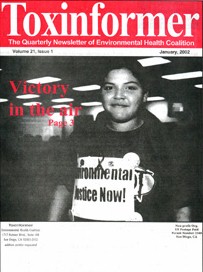
This month, delegates from Environmental Health Coalition’s Border Environmental Justice Campaign will travel to Porto Alegre, Brazil for the second-annual World Social Forum, Jan. 31 to Feb. 5. EHC Organizer Magdalena Cerda and Policy Advocate Connie García hope to learn from other activists around the world about cross-cultural organizing and advocacy work in the struggle for environmental and social justice. They also will share some of their experiences with binational organizing and advocacy in the San Diego/Tijuana border region.
EHC’s delegates are part of a group of ten U.S. organizations sponsored by the French American Charitable Trust, a progressive foundation which supports EHC and other social justice organizations.
More than 50,000 delegates from all continents, representing trade unions, social movements, non-governmental organizations, parliamentarians and mayors, are expected to attend.
The first WSF took place in Porto Alegre in January, 2001. It was a resounding success, and was attended by more than 15,000 people. The success of the first WSF brought up the need to continue to have these forums and provide a space for activists from around the world to come together.
What is the World Social Forum?
The WSF is a "movement of movements." It is a new international arena for the exchange of social and economic projects that promote the idea that "Another World with Peace and Justice" is possible. It provides a space for building global economic alternatives, for exchanging experiences and for strengthening alliances between NGOs, unions and social movements. It will also be an opportunity for developing concrete projects, to educate the public, and to mobilize the international civil society on issues that include human rights, indigenous people’s rights, women’s rights, environmental protection, social justice and sustainable development.
The WSF developed out of a growing international movement that advocates for greater participation of civil societies in international financial institutions such as the International Monetary Fund (IMF), the World Bank, and the World Trade Organization (WTO). For decades, these institutions have been making decisions that affect the lives of people all over the world, without a clear system for accountability and democratic participation.
Every year the leaders of the richest nations together with the global corporate elite retreat to Davos, Switzerland to the World Economic Forum (WEF) to discuss the global corporate agenda. Since 1971, the WEF has played a key role in formulating economic policies throughout the world. It is sponsored by a Swiss organization that serves as a consultant to the United Nations and it is financed by more than a thousand corporations.
This year, the meeting was moved to New York, and it will also take place from Jan. 31 to Feb. 5. While the world’s powerful will be meeting in New York, thousands of people from all continents representing those excluded by their policies will be meeting at the World Social Forum counter conference.
Look for a full report on the World Social Forum in the next issue of the Toxinformer.
